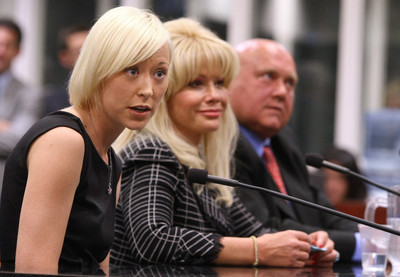$5 tax per tryst fine by them, sex workers tell lawmakers
CARSON CITY -- Three legal prostitutes told legislators Tuesday that they support a $5 tax for every session with a client as a way of doing their part to help the state solve some of its financial woes.
"I love my job and thank the great state of Nevada for allowing me to work at a job I love," said Deanne "Air Force Amy" Salinger, a prostitute at the Moonlite Bunny Ranch in Lyon County just outside Carson City. "If $5 a person can raise $2 million a year, I am for it."
Another Bunny Ranch prostitute, Brooke Taylor, and Love Ranch sex worker Chloe Daniels also testified in support of Senate Bill 369.
All three women have been featured on TV shows and in movies.
Under the bill, patrons would be assessed a $5 tax when hiring a legal prostitute. It would be the first time Nevada has levied a direct tax on prostitution.
Since 1971, Nevada has allowed rural counties to decide whether to legalize prostitution. Twenty-five brothels operate in eight counties.
Though it probably was one of the most unusual Senate Taxation Committee hearings in years, the bill has virtually no chance of passing. The committee took no vote Tuesday, and under legislative rules the committee must approve the bill by Friday or it will be considered dead for the remainder of the 2009 Legislature.
Gov. Jim Gibbons has said he would veto such a bill. He has vowed to veto all tax bills, but he also opposes this particular piece of legislation, saying it would legitimize the industry.
In addition, an Associated Press poll found that most of the seven members of the committee oppose the bill.
Nationally known prostitution opponent Melissa Farley delivered the strongest criticism Tuesday.
SB369 is "an act of legislative pimping," she told the committee.
"The state would step into the role of pimp with the $5 pimp's cut going to the government," said Farley, a psychologist who has studied the effects of prostitution on women.
The message to pimps would be "come over to Nevada," she added. "We consider you another business here."
Daniels, however, objected to Farley's comments.
Daniels said she and other legal prostitutes got into the business as a matter of choice and have not suffered any brutality.
"If it is not for you, you are more than welcome to leave," Daniels added.
Moonlite Bunny Ranch owner Dennis Hof expressed support for the tax, saying passage would bring "respectability and acceptability" to the brothel industry.
"This bill would do it," added Hof, who has appeared on an HBO series on his brothels. "It would show we are giving back to the state."
Sen. Terry Care, D-Las Vegas, said prostitution may be legal in Nevada, but "I don't agree it is respectable."
George Flint, the lobbyist for the Nevada Brothel Association, said that about 400,000 exchanges of sex for money occur each year in Nevada brothels, although business has been hurt because of the recession. The tax would raise $2 million a year, he said.
But Hof said only a small portion of the prostitution business in Nevada takes place in legal brothels.
He said he doubts that legal authorities in Reno and Las Vegas really want to stop prostitution.
"People come to Nevada for vice," Hof said. "They come to gamble, have fun with ladies, go to strip clubs."
He said police have the resources to stop illegal prostitution if they wanted to. Pimps, for instance, should be given tough prison terms, up to 20-year sentences, for running underage prostitutes, Hof said.
The bill was drawn up by the Senate Taxation Committee at the request of its chairman, Sen. Bob Coffin, D-Las Vegas.
"I am not one of those people who feels we cannot touch money from this legal business," Coffin said, noting he has heard dozens of people complain that there is not enough money for mental health and other services.
The state has not collected a dollar in taxes from prostitution since it was legalized in some rural Nevada counties more than 30 years ago, and Coffin said that should change because the state is desperate for revenue, "and we have an industry willing to pay."
He added that part of the estimated $2 million a year in revenue would help pay for a state ombudsman to counsel sex workers.
Brothels pay local jurisdictions' assorted fees, which can be significant portions of their budgets.
Moves to tax prostitution in 1991 and 2003 failed.
The Associated Press contributed to this report. Contact Capital Bureau Chief Ed Vogel at evogel@reviewjournal.com or 775-687-3901.

















